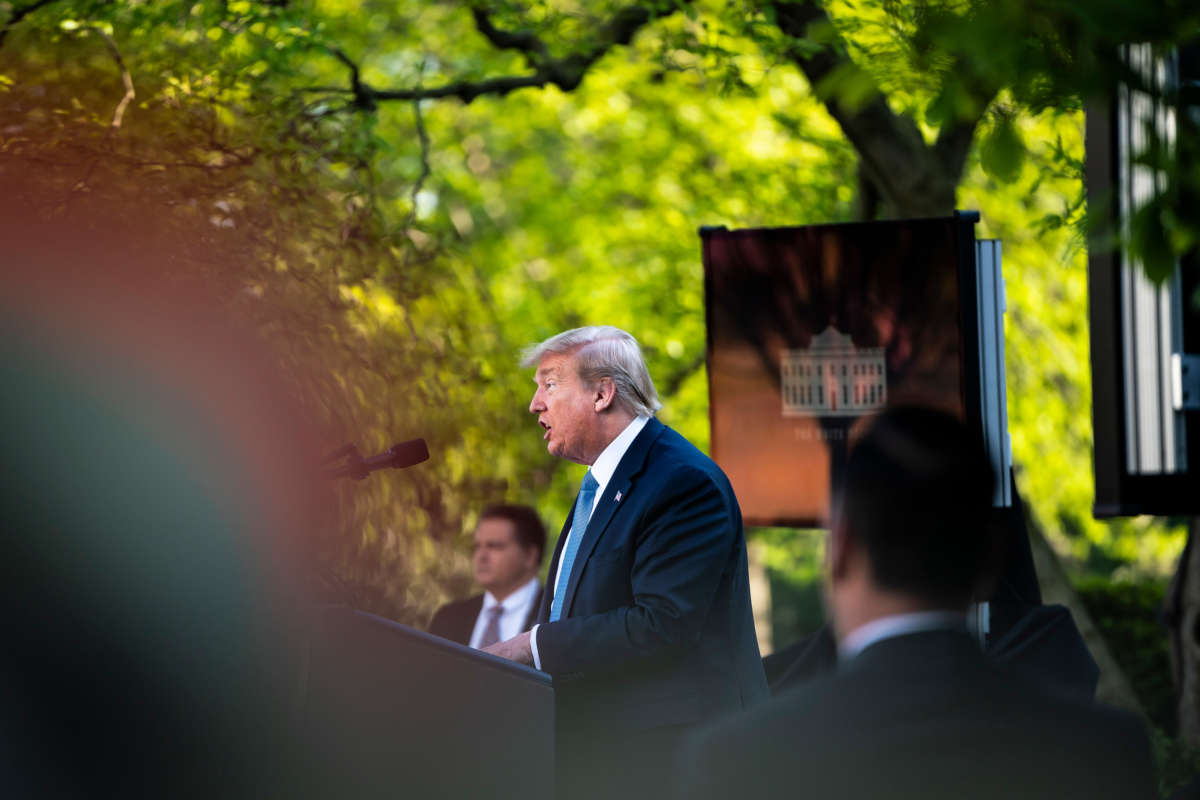Part of the Series
Despair and Disparity: The Uneven Burdens of COVID-19
During a press event at the White House on Wednesday, President Donald Trump complained that Democrats were blocking many of his political appointments from consideration, in spite of the fact that hundreds of positions are vacant simply because he hasn’t actually nominated anyone to fill them yet.
Some individuals he’s tried to appoint have also been held up in Republican-controlled committees. Yet it’s Democrats, Trump insisted during the press briefing, who were to blame.
Regardless of whether his assertions were correct or not, the president threatened to use a little-known (and never tried) constitutional provision that would allow him to adjourn Congress and place his nominees in their positions through recess appointments.
Trump used the current coronavirus pandemic as justification for why he needed to act swiftly on the matter. “If they don’t act on getting these people approved — we need them anyway — but we especially need now because of the pandemic, we are going to do something,” he said.
The president recognized that the utilization of this power might be scrutinized and disputed. “We’ll probably be challenged in court, and we’ll see who wins,” Trump said.
Article II Section 3 of the U.S. Constitution indeed allows the president to adjourn either or both houses of Congress, but it stipulates that the House of Representatives and the Senate need to be in dispute “with respect to the time of adjournment.” No dispute currently exists, and the Constitution doesn’t explicitly say a president can use this power for any other purpose, let alone forcing through executive appointments.
Several legal minds weighed in on the matter as well, through social media or interviews on the subject after Trump announced his intended plans.
“Article II of the Constitution gives the President the power to adjourn Congress if — and only if — the House and Senate cannot agree on a date for ending the current session,” Stephen Vladeck, University of Texas School of Law professor, said in a tweet. “But they have agreed — January 3, 2021.”
Harvard Law School professor Laurence Tribe argued that Trump’s power move could cause real harm to the American people.
“These empty threats — first, to control the governors; then, to adjourn the Senate — are far from harmless,” Tribe wrote. “They divert and distract while testing the waters to see what he might be able to get away with. In the meantime, Americans suffer and die.”
Lawmakers in Congress also weighed in on the matter. Rep. Jamie Raskin, a Democrat from Maryland, explained to The Washington Post that Trump’s plan for “dissolving an assembly … comes out of a dictator’s handbook.”
“That’s banana republic stuff,” Raskin added.
On the opposite side of the spectrum, conservative Rep. Justin Amash (I-Michigan), also viewed Trump’s plans as unlawful.
“Without one chamber participating in this improper scheme, this action would be unconstitutional. The president has no general, unilateral power to adjourn Congress,” Amash wrote on Twitter.
Trump’s statements in recent days have become increasingly alarming to many, bordering, in some people’s minds, to behavior more fitting of a king than a democratically elected official. This past week, in fact, Trump claimed to have “total” authority on when to end stay-in-place orders across the country and restart closed aspects of the nation’s economy — a claim legal experts have refuted.
Join us in defending the truth before it’s too late
The future of independent journalism is uncertain, and the consequences of losing it are too grave to ignore. To ensure Truthout remains safe, strong, and free, we need to raise $43,000 in the next 6 days. Every dollar raised goes directly toward the costs of producing news you can trust.
Please give what you can — because by supporting us with a tax-deductible donation, you’re not just preserving a source of news, you’re helping to safeguard what’s left of our democracy.
